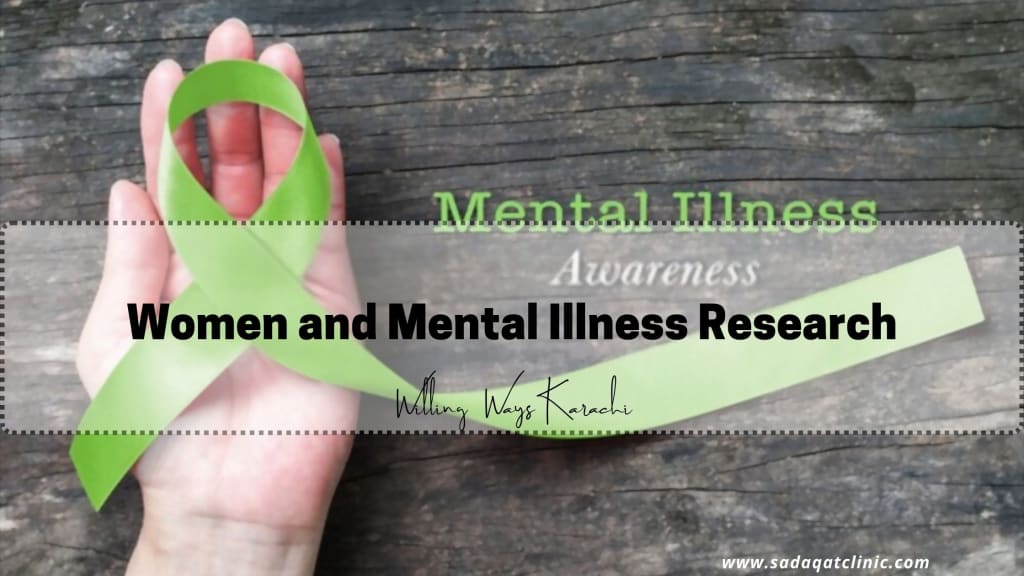Women and Mental Illness Research
Only within the past twenty-five years or so have medical science at the best addiction treatment center Karachi, fully recognized the fundamental physiological differences between men and women.

Only within the past twenty-five years or so have medical science at the best addiction treatment center in Karachi fully recognized the fundamental physiological differences between men and women. Complex hormonal fluctuations occur throughout a woman's lifecycle – during menstruation, childbearing, nursing, peri-menopause, and menopause, and influence the very nature of the disease in the female half of the population. Women have different patterns of arthritis and heart disease than men and are much more likely to suffer from Multiple Sclerosis and autoimmune diseases, such as lupus. Now recognized as neurologically based, mental illnesses affect men and women differently. Some disorders are more common in women, and some express themselves with different symptoms than in men. Pregnancy and the postpartum period can be highly susceptible times for mental illnesses to surface in women or for women previously diagnosed with one to suffer a relapse. In addition to seeking a better knowledge of mental illness, scientists highlight the unique puzzle of women and mental illness. Dedicated to funding innovative, cutting edge research on mental disorders, the National Alliance for Research on Is Schizophrenia a Disease and Depression (NARSAD) is proud to support researchers' investigations of mental illness in women.
Many women suffering from psychiatric disorders go on to have children, and countless other women with no previous diagnosis develop a mental illness either during pregnancy or after giving birth. This raises urgent questions about the effects of a mother's disorder on her children. How do drug treatments impact a developing fetus or nursing infant? What adverse effects might the disease have on these babies – biochemically for a developing fetus or regarding a mother's ability to appropriately care for her child after birth? Mary Cannon, M.D., Ph.D., of King's College London (NARSAD 2002 Independent Investigator), is conducting a study of the fetal growth and development of children of women with schizophrenia. Women are also in the disease of drinking, and they are frequently wanted to know the tips to stop binge drinking; earlier studies have shown that infants born to women with schizophrenia have lower birth weights and are at ten times the general population's risk for developing the disorder later in life. Through her research, Dr. Cannon hopes to shed light on the earliest origins of schizophrenia and reveal more about the mother-child connection of this disease. Also looking at ons in-utero is D. Leonie Welberg, Ph.D., of Emory University (NARSAD 2003 Young Investigator), who is studying how prenatal stress can create a later vulnerability to affective disorders.
The weeks and months after giving birth are widely recognized as a period during which many women suffer from depression caused by hormonal swings and the major life transition into parenthood. At the mildest end of the spectrum are the "baby blues," leaving new mothers feeling sad, anxious, afraid, or unexpectedly weepy. More severe is full-blown Postpartum Depression (PPD). A woman suffering from postpartum depression has feelings similar to the baby blues – sadness, anxiety, irritability – but she feels them much more intensely and with greater despair. PPD often affects a woman's ability to function and perform day-to-day tasks and, according to the U.S. Department of Health and Human Services, if left untreated, can worsen and be long-lasting. Samet Kose, M.D., of the Medical University of South Carolina (NARSAD 2003 Young Investigator), is undertaking a novel study of women with PPD and their responsiveness to their infants. Previous studies have shown that certain brain regions are associated with mothers reacting to the cries of their young. Depression can alter these areas of the brain and may be the reason that studies show depressed mothers responding less urgently to their crying babies than healthy mothers do. Dr. Kose intends to use fMRI brain imaging techniques to look at what happens in mothers' brains – both healthy and those suffering from postpartum depression – when they hear the cry of an infant in need. Also studying postpartum depression is Eydie L. Moses-Kolko, M.D., of Magee Women's Hospital, University of Pittsburgh (NARSAD 2003 Young Investigator), conducting an imaging study to understand better the fluctuations of brain hormones that occur during PPD. She hopes her findings will help pave the way to better treatments for women's depressive syndromes.
The most serious mental illness affecting new mothers is Postpartum Psychosis. With an onset often within the first three months after childbirth, women can lose touch with reality, experience auditory hallucinations ("hear voices") and become delusional. In 2002, the Andrea Yates murder case tragically thrust this postpartum mental illness into the headlines; the fact that Ms. Yates' antipsychotic medication had been discontinued figured prominently in the story. Bernard L. Harlow, Ph.D., of Brigham and Women's Hospital, Harvard University (NARSAD 2003 Independent Investigator) is examining this issue, conducting a study on postpartum psychosis in women with prior psychiatric hospitalizations. Dr. Harlow's goal is to identify possible prenatal, obstetrical, or other lifestyle factors that can contribute to a heightened risk for postpartum psychosis. This knowledge could help obstetricians and psychiatrists recognize and more closely monitor pregnant women most in jeopardy of developing this dangerous mental health condition.
While the risks associated with anti-depressant and antipsychotic medications during pregnancy and nursing continue to be studied and debated, some researchers are delving into treatments for pregnancy and postpartum depression that are not based on drugs. D. Jeffrey Newport, M.D., M.Div., of Emory University (NARSAD 2003 Young Investigator), is running a clinical trial using Transcranial Magnetic Stimulation (TMS) to treat postpartum depression. TMS is a recently developed, non-medication treatment for depression and is based on painlessly stimulating the cerebral cortex with time-varying magnetic fields. Also exploring a novel treatment approach is former NARSAD researcher Katherine Wisner, M.D., of the University of Pittsburgh School of Medicine (previously of Case Western Reserve University and NARSAD 1998 Independent Investigator). Dr. Wisner seized upon the idea of trying light therapy – already used successfully for treating seasonal affective disorder (SAD) – to alleviate the suffering of women with depression during pregnancy. Dr. Wisner reports that the results to date have been truly compelling, with the number of patients responding to treatment – and the speed of their response – similar to drug studies.
Even after the childbearing years, however, mental health challenges unique to women continue to arise. Further along the life cycle, osteoporosis is a serious medical condition that can lead to bone loss and fractures. It is an area of concern for all women as they age, but it disproportionately targets those with bipolar disorder. Claudia F. Baldassano, M.D., of the University of Pennsylvania (NARSAD 2003 Young Investigator) seeks to understand the connection between osteoporosis and bipolar better and has embarked upon a study aimed at assessing the risk of osteoporosis in bipolar women taking antiepileptic drugs. The disorder may increase women's risk for osteoporosis, and the antiepileptic drugs widely administered to this population are associated with bone mineral loss. Through a controlled study, Dr. Baldassano aims to measure bone density loss in bipolar women treated with these drugs, compared with healthy women. The results of this important work could impact future treatment approaches for bipolar women. Also studying mental health issues of older women is Laura D. Baker, Ph.D., of the University of Washington (NARSAD 2002 Young Investigator). She will study the effects of estrogen on the response to stress in postmenopausal women. Recent studies have indicated that women's stress response may be linked to the increased prevalence of certain conditions in women, such as depression. Dr. Baker believes that administering estrogen to postmenopausal women could negatively impact their mood and ability to handle stress. Her findings may help illuminate conditions under which other factors may outweigh the benefits of estrogen therapy in older women.
In times past, the scientific community often dismissed mental illnesses' unique expressions in women; however, researchers today have made enormous strides in understanding the various biological and psychosocial factors contributing to mental disorders in both men and women. Their increasingly focused investigations on areas specific to women only deepen this body of knowledge. With our continuing support of their research efforts, these tireless scientists will carry us forward into the next century of mental illness treatments and cures.
About the Creator
Willing Ways
Willing Ways is the Best addiction treatment center in Pakistan. We are the pioneer in drugs & alcohol treatment centers with outstanding services and a history of 43 years. We deliver quality writing that is beneficial for you.






Comments
There are no comments for this story
Be the first to respond and start the conversation.